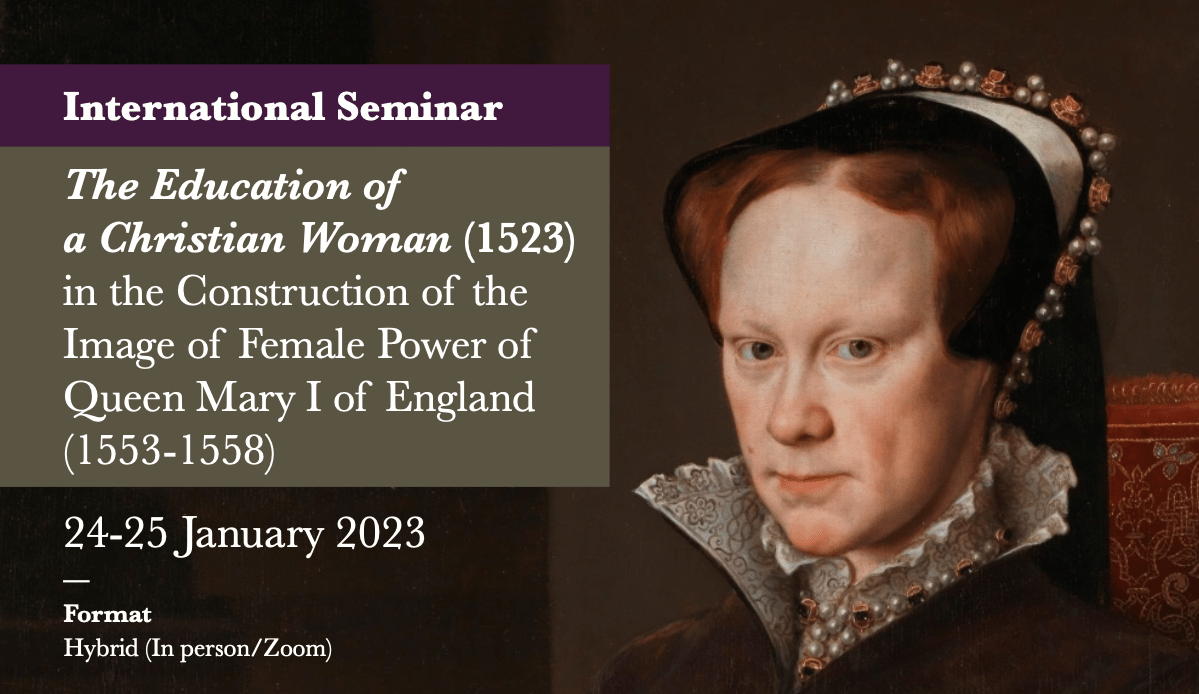Sponsored by Arte, Poder y Género Research Group, BritishSpanish Society, Instituto Cervantes and University College London, this international seminar takes place 24-25 January 2023, and celebrates the 500-year anniversary of the first publication of The Education of a Christian Woman. It will focus on its patron, author, and dedicatee as well as address its impact on the construction of the image of female power in Tudor England.
In 1523, De institutione feminae Christianae, the book’s first title, was published. The author was Spanish Humanist Juan Luis Vives (1493-1540) who at the time was also a Lecturer at Corpus Christi Col- lege in Oxford. The book was commissioned by his ‘only patron’, the Queen of England, Catherine of Spain, commonly known as Catherine of Aragon (1485-1536). It was written in Latin, the language of the New Learning movement it belongs to, and it focused on the three stages in which Vives divided a woman’s life: as a maiden, as a married woman and a matron, and as a widow. It was dedicated to Princess Mary Tudor future Queen Mary I (1516-1558). It was part of a wider curriculum that Queen Catherine designed for her daughter’s formal training as first ‘heiress apparent’ to receive a formal Renaissance education in England.
The book was an instant success throughout Europe with many reprints, and it became the most influential work of its kind in the Modern Age. The Education of a Christian Woman had an impact in the way that Mary I constructed her image of power as the first Queen Regnant in English history. Despite this, Queen Catherine’s role as intellectual and financial patron is often overlooked and the connections between the manual and Mary I’s trailblazing propaganda as the first woman to be educated to rule have yet to be explored.
This international seminar will focus both on visual arts and documentary evidence that deals with this important void in queenship historiography. Leading specialists in several fields will address topics like the Christian education of the daughters of Queen Isabella of Castile and the ties between the Spanish alliance and the construction of the image of female power in Tudor portraiture. Other important subjects will speak to Queen Mary I’s use of female recourses present in Vives’ work in the representations of the monarch as Queen Regnant, as ‘Mother of England’, and as married woman and queen consort of King Philip of Habsburg (1527-1598). Other experts will talk about Mary I’s role as first woman to exercise power and how this was translated after her reign. Another crucial topic that will be discussed is the growing historiographical trend that is bringing into the light Queen Mary I’s outstanding contributions in female rulership in Renaissance Europe.
To register for this free in-person / Zoom seminar, please send an email to artepoderygenero@um.es
Programme
24 January.
Location: Instituto Cervantes. 15-19 Devereux Ct, Temple, London.
5.00 pm – 5.45 pm (GMT)
Las mujeres cristianas en los intercambios de retratos entre la Monarquía Hispánica y la dinastía Tudor. Emma Luisa Cahill Marrón. BritishSpanish Society Scholar.
(Presentada por Noelia García Pérez).
5.45 pm – 6.30 pm (GMT)
Mary I & the Art of Queenship.
Peter Stiffell. Doctoral Candidate at the University of Kent.
(Presented by Alexander Samson).
6.30 pm – 7.30 pm (GMT) ROUNDTABLE.
Educating the Eye: Gender, Power, and Representation in the Visual Arts in the Reign of Mary I.
The Pregnant Female Body in Early Modern English Royal and Elite Portraiture.
Karen Hearn.
Honorary Professor at Department of English Language and Literature in the University College London / Previously Curator of 16th & 17th Century British Art at the Tate Galleries.
Happily (N)Ever After: The Posthumous Role of Mary I and Philip II’s Marriage in Visual Remembrances of Mary’s Reign.
Johanna Strong. University of Winchester / Royal Studies Network. Like Mother, Like Daughter? Continuity and Innovation in the Crafting of Image of Mary I.
Aoife Stables. Master of Arts in Art History. Courtauld Institute of Art.
Participants
Patricia Manzano Rodríguez. Doctoral Candidate at the University of Durham / The Maius Workshop.
Irini Picolou. Doctoral Candidate at the University of Durham / Zurbaran Centre for Spanish and Latin American Art.
25 January.
Location: Common Ground, South Wing, University College London.
9.30 am – 10.15 am (GMT)
Before Vives. The Christian Education of the Daughters of Queen Isabella of Castile.
Melania Soler Moratón.
Margarita Salas Postdoctoral Researcher at the University of Valladolid / University of Murcia / Arte, Poder y Género Research Group / MEFER Project.
10.15 am – 11.00 pm (GMT)
Juan Luis Vives’ ‘Patronae Unicae’: Queen Catherine of Aragon and the Construction of the Image of Female Power in Tudor England.
Emma Luisa Cahill Marrón. BritishSpanish Society Scholar / Arte, Poder y Género Research Group / MEFER Project.
11.00 am – 11.45 am (GMT)
Early Modern Women and the Archive.
Alexander Samson.
Professor of Early Modern Studies at the University College London.
11.45 pm – 1.45 pm (GMT) LUNCH
1.45 pm – 2.30 pm (GMT)
The Continued Instruction of Christian Women: Reprints of Vives.
Valerie Schutte.
Independent scholar.
2.30pm – 3.15 pm (GMT)
The Power of Networks and The Networks of Power: The Development and Cultivation of Female Friendship by Mary I, for both Personal Solace, and Political Capital.
Melita Thomas.
Doctoral Candidate at the University College London.
3.15 pm – 3.30 pm (GMT) COFFEE BREAK
3.30 pm – 4.30 pm (GMT) ROUNDTABLE
‘The Education of a Christian Woman’ in the Context of Queenly Education.
Elena (Ellie) Woodacre.
Reader in Renaissance History at the University of Winchester / Royal Studies Network.
